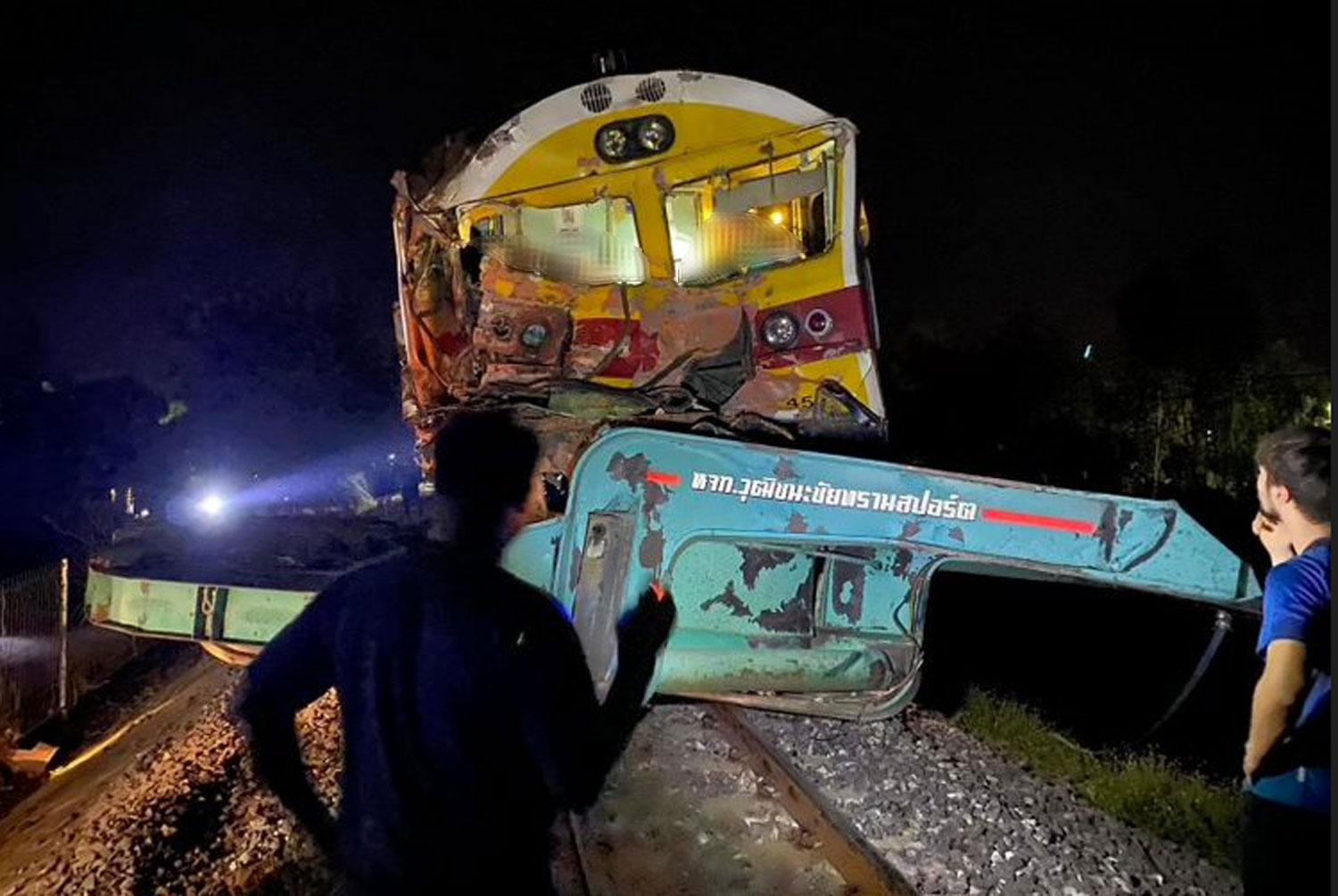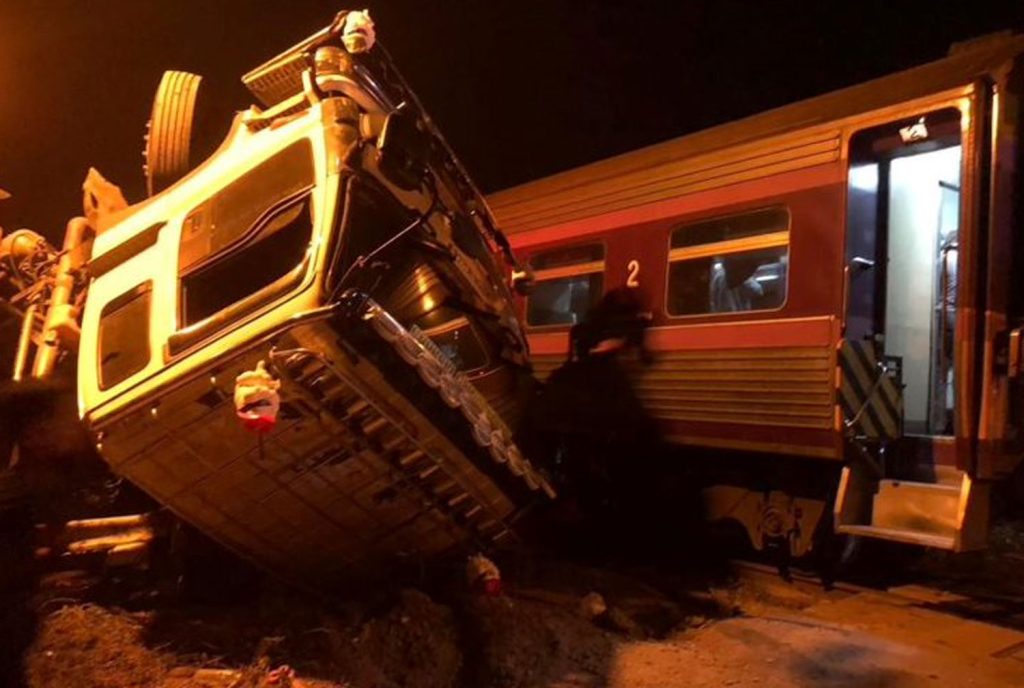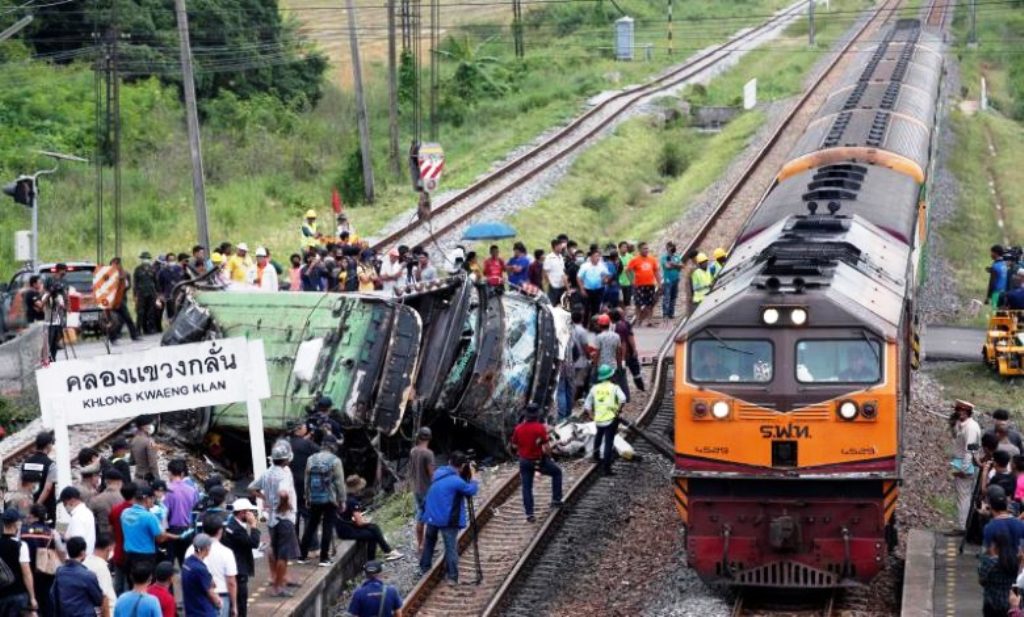A passenger train bound for Chiang Mai has collided with a trailer truck carrying a excavator at a crossing in Chumsaeng district of of Nakhon Sawan, killing the driver and injuring five others and causing a train derailment.
According to authorities, the incident occurred at the Khlong Samphrueng railway crossing in Tambon Phanlan at around 7.30 p.m. on Friday.
According to authorities, rapid train No. 109 on the Krung Thep Aphiwat Central Terminal-Chiang Mai route left Bangkok’s terminal at 2.15pm on Friday. As it approached the crossing in Chumsaeng district, the 18-wheel trailer truck drove into the train’s path.
The train driver failed to apply the brakes in time, resulting in the train colliding with the truck. The locomotive was severely damaged causing a train derailment, and the impact of the crash caused the truck to overturn. The excavator slid from the truck and onto the railway tracks.
The locomotive operator, Pradit Phromma was crushed in the crash. Five more people were hurt, including four female train passengers and the trailer truck driver. All were brought to Hospital and later released.
The crash cause a train derailment and halted train operations on the northern route. Railway officials prepared buses to transport train passengers. Rail services resumed at 7.15 a.m. on Saturday. Thailand’s State Railway expressed apologies and launched an investigation into the occurrence.
Railway Crossing Accidents
Speed limit railway crossing crossing accidents in Thailand have been a common source of concern, with multiple events resulting in fatalities and injuries despite the crossings marked with a railway crossing sign.
A recent incident between a goods train and a pickup truck in Thailand’s Chachoengsao province killed eight people, highlighting the country’s critical issue of railway safety. In a terrible event on August 4th, 2023, a freight train collided with a pickup vehicle at a railway crossing in Chachoengsao province killing eight people.
The train hit with the pick-up’s left side, causing it to skid off the road. The workers in the back of the car were ejected upon impact, killing eight and injuring three. This horrific incident has once again highlighted the essential need for stronger safety measures at Thailand’s railway crossings.
The crash serves as a harsh reminder of the potential perils of railway crossings and the importance of strict safety standards. Railway crossing accidents can occur for a variety of reasons, including poor visibility, insufficient warning signs, and human error.
According to road safety advocates, it is critical to thoroughly investigate the conditions that led to such accidents and implement preventive measures to reduce the likelihood of future mishaps.
Enhancing Train Crossing Safety Measures
Enhancing safety measures at railway crossings is critical to averting future incidents and protecting commuters’ lives.
This includes the installation of sophisticated warning systems, regular maintenance of crossing equipment, and public awareness efforts to educate people about the dangers involved with railway crossings.
Addressing the issue of railway crossing accidents requires a coordinated effort by relevant authorities, transportation agencies, and the community.
By creating relationships and leveraging resources, it is possible to implement significant improvements that prioritise safety and reduce the chance of accidents at railway crossings. Finally, creating a culture of safety in railway transit is critical.
Encouraging responsible behaviour among vehicles, pedestrians, and railway personnel can considerably help to reduce the number of accidents at railway crossings and build a safe environment for all individuals.
It is possible to establish a safer and more secure environment for people who use railway crossings by addressing all of the variables that contribute to such accidents and implementing strong safety measures.
Collaborative efforts and a shared commitment to promoting safety are critical for implementing good change and lowering the risk of future incidents.








